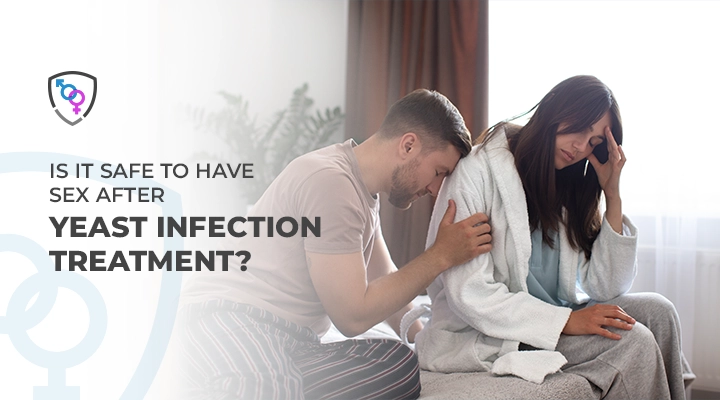You’ve just completed treatment for a yeast infection, and now you’re wondering: Is it safe to have sex after a yeast infection? This is a very common concern, especially when symptoms begin to fade. However, resuming sexual activity too soon may increase discomfort, delay healing, or even trigger a recurrence.
At Manhattan STD Testing, we understand these concerns. In this article, we’ll explain how long to wait for sex after yeast infection treatment, whether yeast infections are contagious, what may cause yeast infection after sex, and how to protect your health and your partner’s.
Can You Have Sex With a Yeast Infection?
Technically, it’s possible, but it’s not recommended.
During an active yeast infection, the vaginal area is often inflamed, sensitive, and irritated.
Having sex during this time can lead to:
- Burning or pain during sexual activity
- Increased inflammation
- Worsening symptoms
- Delayed healing
So, is it safe to have sex with a yeast infection?
Most medical experts recommend waiting until all symptoms have completely resolved before resuming sexual activity.
When Is It Safe to Have Sex After Yeast Infection Treatment?
Treatment duration depends on the type:
| Treatment Type | Typical Duration | When You Can Resume Sexual Activity |
| Single-dose antifungal medication | 1 day | Usually safe after full symptom relief |
| Short-course topical treatment (1–3 days) | 3 days | Typically wait 3–7 days after symptoms clear |
| Longer topical treatment (7 days) | 7 days | Wait until treatment is complete and irritation is gone |
Wait until all itching, discharge, and irritation are completely gone, which usually takes about 3–7 days after treatment.
Are Yeast Infections Contagious? Can You Pass It to a Partner?
Yeast infections aren’t officially classified as sexually transmitted infections (STIs). However, yes, in some cases, you can pass a yeast infection to your partner, especially if they are sensitive or have a weakened immune system.
Possible partner symptoms may include:
- Redness or irritation
- Itching
- Discomfort after contact
If your partner notices symptoms, they may also need treatment to prevent reinfection.
Why Yeast Infection Symptoms May Return After Sex
Some people notice a yeast infection after sex. This can happen due to:
- Friction causing irritation and disturbing healing
- Semen affecting the natural vaginal pH
- Certain lubricants or scented products disrupting the natural balance
These factors can trigger what causes yeast infection after sex, especially if the area is still healing or prone to imbalance.
What Happens If You Have Sex Too Soon?
If you resume sexual activity before your yeast infection has fully healed, you may experience:
- Burning, soreness, or pain
- Prolonged or worsening inflammation
- Recurrent infection
- Possible transmission to your partner
- Reduced effectiveness of treatment
In short, having sex too early can undo your progress and restart the infection cycle.
How to Protect Yourself and Your Partner
Once symptoms are completely gone and treatment is finished, you can resume sexual activity more safely.
To reduce the risk of recurrence:
- Avoid unprotected sex during active infection
- Choose protection methods for future encounters
- Avoid scented products or harsh lubricants
- Maintain vaginal pH balance
- Encourage your partner to seek treatment if they develop symptoms
If infections keep recurring, consult our healthcare provider for evaluation and possible preventative strategies.
How Long Can Yeast Infections Last & When to See a Doctor
- With treatment: Most yeast infections improve within 3–7 days
- Without treatment: They may last longer and worsen over time
Consult our doctor if:
- Symptoms persist beyond 7 days
- You experience frequent recurring infections
- You have burning, unusual discharge, or pain that feels different than a typical yeast infection
- A partner develops symptoms
Is a Yeast Infection an STD?
No, a yeast infection is not an STD. It’s typically caused by an overgrowth of Candida yeast that naturally lives in the vaginal environment. However, sexual activity may trigger or worsen symptoms in some individuals.
Still, other infections—such as bacterial or sexually transmitted infections like chlamydia, trichomoniasis, or others, can mimic yeast infection symptoms. This often leads people to wonder: What STD causes yeast infection-like symptoms?
Since many conditions have overlapping symptoms (such as itching, discharge, or discomfort), getting evaluated or tested is important if symptoms are unusual or persistent. In some cases, conditions like chlamydia or trichomoniasis, both of which can cause similar symptoms, may be present and require specific testing, such as our chlamydia testing or trichomoniasis testing services.
Conclusion
To protect your health and avoid reinfection:
- Wait until treatment is finished and all symptoms are gone
- Avoid unprotected sex until the area is fully healed
- Seek medical guidance if symptoms return or worsen
- Talk openly with your partner if symptoms appear on their side
Taking time to allow full healing not only protects your comfort but also helps prevent recurring infections and supports long-term sexual wellness. For added peace of mind, you may consider a testing service from Manhattan STD Testing, such as our comprehensive STD Panel, which screens for multiple infections. If you are concerned about viral infections such as HPV, our HPV testing service is also available.
Frequently Asked Questions
Can stress cause a yeast infection?
Yes, stress may weaken the immune system, making it easier for yeast overgrowth to occur.
Can diet affect yeast infections?
High sugar intake can contribute to yeast growth, so dietary changes may help prevent recurrence.
Do yeast infections always have discharge?
No, some individuals may experience itching or irritation without noticeable discharge.
Can tight clothing trigger a yeast infection?
Wearing tight or non-breathable clothing can create a warm, moist environment that encourages yeast growth.
Are recurring yeast infections a sign of another health issue?
Frequent infections may indicate an underlying condition such as hormonal imbalance or weakened immunity and may require further testing.
Disclaimer
This blog is for informational & educational purposes only and does not intend to substitute any professional medical advice or consultation. For any health-related concerns, please consult with your physician, or call 911.

-
About The Author
Dr. Syra Hanif M.D.Board Certified Primary Care Physician
Dr. Syra Hanif is a board-certified Primary Care Physician (PCP) dedicated to providing compassionate, patient-centered healthcare.


